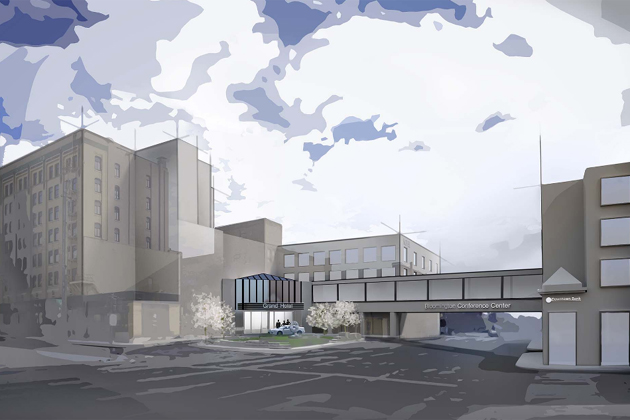
By Eric Stock
BLOOMINGTON – There’s been so much new business development in Bloomington-Normal over the last decade or so that parts of this community are hardly recognizable. But both the Twin Cities have dealt with large-scale projects that have had trouble getting off the ground as WJBC reports on one of the top stories of 2016.
It’s been a dream for some in Bloomington since U.S. Cellular Coliseum opened a year ago: a downtown hotel. East Peoria developer Jeff Giebelhausen came to town proposing to build a hotel and conference center near the Coliseum as part of a more than $50 million development that would include a restaurant, parking garage and pedestrian sky bridge.
The city balked at the financial risk, despite Giebelhausen’s claims that the city’s risk would be minimal.
“The hotel would not be owned by the city, the conference center would not be operated by the city,” Giebelhausen said. “These are free enterprises and the reality of it is revenue sharing is needed to make it happen.”
Giebelhausen came back with a scaled-down proposal, but the city didn’t want that either.
“We don’t want a hotel in downtown Bloomington that gets a reputation of renting rooms by the hour,” Renner said. “That’s not going to be an attraction.”
Normal had planned to build an overpass for pedestrian and bicycle traffic at Uptown Station. Bids went out in 2014, but the town put the brakes on that in 2016 and decided instead to explore an underpass at the tracks.
“It won’t be inexpensive, I can say that,” city manager Mark Peterson said as the town authorized a $1.4 million feasibility study.
Town officials say the underpass would provide a better link to development south of the railroad tracks.
The Twin Cities for a time explored the idea of sharing sales revenue by creating one pie and dividing it based on population. Several business groups got behind the idea.
“People don’t really pay that much attention to where they shop or where they go to work,” Paul Harmon, chairman of the B-N Advantage Leadership Council said. “They live in one and they work in the other. They shop in one and live in the other. So the concept of sharing sales tax revenue based on the population of the two cities seemed to resonate with the group.”
The proposal went nowhere.
The two cities both celebrated the businesses they won over – in some cases at the expense of the other. Kroger in Normal is moving across College Avenue in Bloomington to build a superstore while Dick’s Sporting Goods made the jump across Division Street.
Normal heralded plans for the first downstate Portillo’s, the iconic Chicago-style restaurant, even offering close to $2 million in incentives.
“Would this deal happen without the incentive and the answer from everything I understand is probably no,” councilman R.C. McBride said.
Eric Stock can be reached at [email protected].






